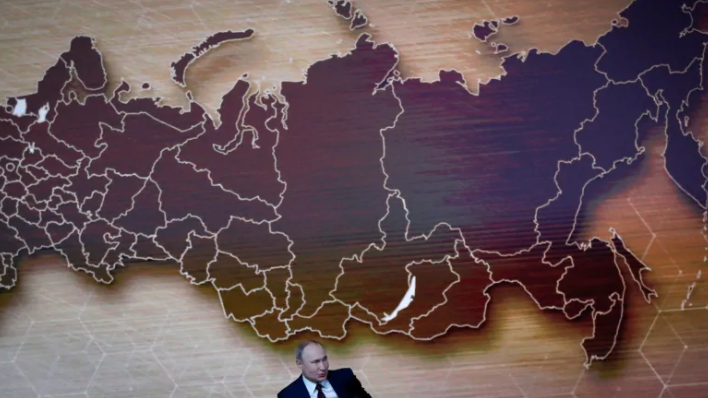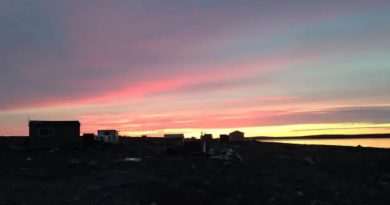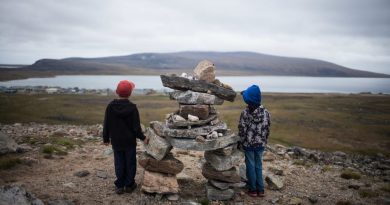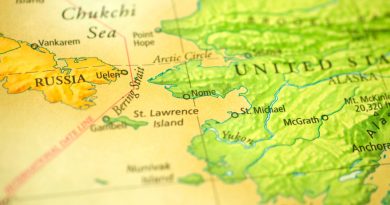What Russia’s $300B investment in Arctic oil and gas means for Canada

North could suffer from increased traffic, potential spills
Last month, the Russian government pushed through new legislation creating $300 billion in new incentives for new ports, factories, and oil and gas developments on the shores and in the waters of the Arctic ocean.
The incentives are part of a broader plan to more than double maritime traffic in the Northern Sea Route, on Russia’s northern coast — and give a boost to state energy companies like Gazprom, Lukoil, and Rosneft.
But analysts say their immediate impact will be increased exploration and development for offshore oil and natural gas.
With Canadian and U.S. offshore oil developments still on ice, here’s what Russia’s big spending could mean for the Arctic — and Canadians.
How is the money being spent?
Russia’s government is offering tax incentives for offshore oil and gas developments, including a reduced five per cent production tax for the first 15 years for all oil and gas developments.
Projects in the east Arctic, closer to Canada’s Beaufort Sea, receive an even greater incentive — no extraction tax for the first 12 years of operation.
Russia may be borrowing a page from Canada’s book in drafting the policy. Doug Matthews, a Canadian energy writer and analyst, said the incentive package sounds “rather like our old national energy program in the … Beaufort [Sea] back in the ’70s and ’80s.”
What new projects are getting the go-ahead?
Russia’s minister of the Far East and Arctic, Alexander Kozlov, said in a press release that those incentives are resulting in three new massive offshore oil projects.
Currently, there is only one producing offshore oil platform in Russian waters — the Prirazlomnaya platform, located in the Pechora Sea.
Russia’s state oil companies are also expected to massively intensify their onshore Arctic operations.
Rosneft’s Vostok Oil project, billed as the “biggest in global oil,” will involve the construction of a seaport, two airports, 800 km of new pipelines, and 15 new towns in the Vankor region.
“The project is expected to become the stepping stone for large scale development of Arctic oil,” said Nikita Kapustin, an energy researcher with the state-funded Energy Research Institute of the Russian Academy of Sciences, in an email.
Developments in the Laptev, East Siberian and Chukchi Seas — nearer to Alaska — are “more distant prospects,” Kapustin said.
But massive incentives for Arctic ports and pipelines could make exploiting those regions more feasible in the future.
What could the environmental impacts be?
Simon Boxall, an oceans scientist at the University of Southampton, said sending more goods via the Northern Sea Route could actually have a positive environmental impact.
“You’re knocking thousands of miles off of that route, and that of course saves energy, it saves fuel, it saves pollution,” he said.
The problem, Boxall says, comes with what those ships are carrying. Any spilled oil degrades slowly in cold Arctic waters, and is easily trapped beneath ice.
Boxall is optimistic that moderate spills from Russia’s offshore oil projects could be contained to “a fairly small locality,” and would be unlikely to affect Canadian shores.
But Tony Walker, an assistant professor at the School of Resource & Environmental Studies at Dalhousie University, disagrees.
“Any petroleum products released into surface water could easily get to the Northwest Territories in just a matter of days,” he said.
“Basically, it’s everybody’s problem.”
Walker says most Arctic nations have limited capacity to perform cleanups in the region. Russia’s fleet is mostly based in Murmansk, near its western border, he says, and is mostly decommissioned anyway.
“So it would really be virtually impossible,” he said.
How could this affect oil and gas prices?
Despite enabling access to more than 37 billion barrels of oil — equivalent to about a fifth of Canada’s total remaining reserves — analysts say the effect on prices should be negligible.
“The main intention of Arctic oil is to replace production of some of the more mature Russian fields,” said Kapustin.
“I don’t see much of an effect on price,” said Matthews.
The primary market for Russia’s Arctic oil and gas is China. Canada’s market share there is so small, Matthews says, it’s unlikely to make a difference.
Could Canadian businesses benefit?
Since U.S. and EU sanctions were put in place in 2014, international oil companies have been reluctant to co-invest in Arctic oil projects. Sanctions prohibit collaboration on offshore oil projects with Russia’s biggest companies.
Canadian businesses also might not have the expertise needed any longer, according to Matthews.
“We were really the leaders back in the ’70s and ’80s for technology for Arctic exploration,” Matthews explained. But “when the oil industry in the Beaufort [Sea] shut down in the mid-’80s … we really lost that technological edge.”
Canada’s recent investment in pipelines means some Canadian companies have built expertise in their construction, including in cold-weather environments.
But Matthews and other analysts say Russia is more likely to look to the East for expertise and investment — to Japan and China, and to India, which Kapustin said has already invested in the Vostok Oil project.
Related stories from around the North:
Canada: Beef up Arctic search and rescue to keep Canada’s North secure, experts argue, CBC News
European Union: Politician calls for stronger EU engagement in Arctic, The Independent Barents Observer
Finland: Why are we so afraid of China, even in the North?, Yle News
Greenland: Controversy over Greenland airports shows China still unwelcome in the Arctic, Cryopolitics Blog
Iceland: Iceland & UK sign agreement to boost security, defence cooperation, Eye on the Arctic
Norway: China’s ambassador to Norway brushes off allegations his country is a threat in Arctic, The Independent Barents Observer
Russia: Russian influence ops seek to fuel discord between Arctic Norway and Oslo, Norwegian intelligence service says, The Independent Barents Observer
Sweden: Faced with Trump’s wavering support for NATO, Nordic nations stick together, The Independent Barents Observer
United States: Trump, the Arctic Council & northern policy in Canada: Arctic stories to watch for in 2020 with Heather Exner-Pirot, Eye on the Arctic



